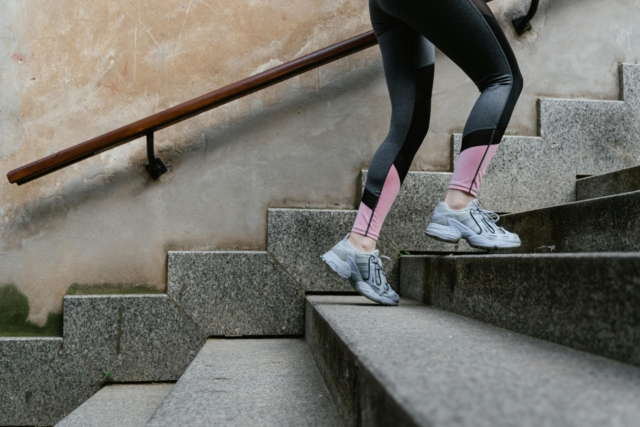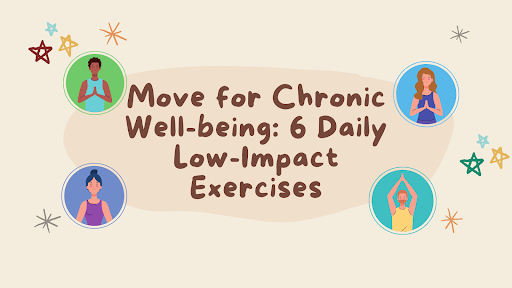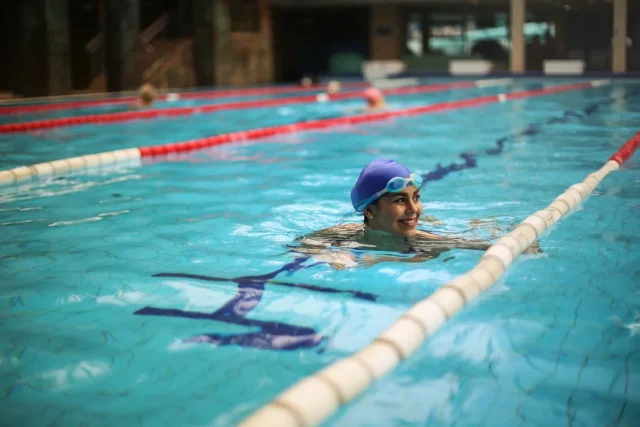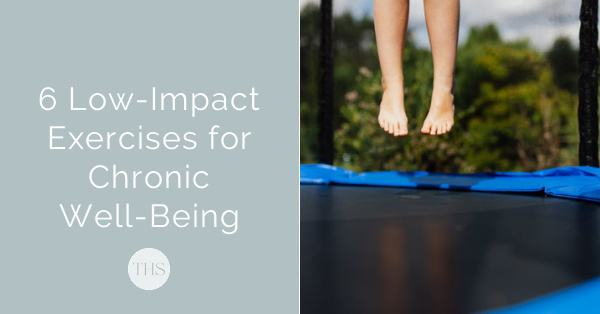‘Kaizen’: How to Apply the 1% Better Principle in Your Chronic Life

Are you looking for sustainable fitness routines that cater to your chronic health conditions or support your injury recovery?
Now is the time to embrace the shift towards low-impact exercises. Integrating these workouts into your daily routine can improve joint health, boost cardiovascular fitness, and enhance overall chronic well-being.
According to the Centers for Disease Control and Prevention (CDC), muscle-strengthening activities can help increase or maintain muscle mass and strength, crucial for older adults to prevent age-related muscle loss. Low-impact exercises offer a gentle yet effective approach to achieving these goals without putting undue stress on your body.

The Upbeat, Low-Impact Workout.
Bungee rebounding is a dynamic, low-impact exercise that combines cardiovascular health benefits with fun. The elasticity of the bungee cords helps reduce stress on your joints while providing a challenging workout that can be adapted to all fitness levels.
To begin bungee rebounding, select appropriate equipment, such as a high-quality mini trampoline and bungee cords that suit your height and weight. Utilize the bungee rebounder, a versatile and joint-friendly fitness tool, by beginning with basic bounces.
Gradually introduce twists, kicks, and jumps to activate various muscle groups. Ideally, engage in lively 20-30 minute sessions, 2-3 times a week, on the bungee rebounder for an invigorating, low-impact workout that boosts cardiovascular health and muscle strength with minimal joint strain.
The All-Encompassing Workout.
Swimming provides a holistic workout that targets your cardiovascular health and muscle strengthening without straining your joints. According to a 2015 study in the Journal of Exercise Rehabilitation, aquatic exercise significantly improved balance, muscle function, and ankle range of motion in elderly patients with lumbar spinal stenosis.
To maximize the benefits of swimming, try incorporating different strokes to engage various muscle groups and enhance calorie burn. Breaststroke, for example, works your chest, shoulders, and legs, while backstroke targets your back, arms, and core. Gradually increase your workout to 30-45 minutes of swimming, 2-3 times a week, to reap the full benefits of this all-encompassing workout.

The Simplest Path to Fitness.
Walking is an accessible and effective low-impact way for you to maintain fitness. Research published in Biogerontology links regular walking to healthy aging, reducing your risk of chronic diseases and enhancing your physical and cognitive function in older age.
To optimize your walking sessions, vary your pace and choose suitable surfaces to minimize joint impact. Start with shorter 10-15 minute walks and gradually increase duration and intensity as your fitness improves. Aim for 30 minutes of walking most days of the week to experience the numerous health benefits walking has to offer.
A Comprehensive Muscle and Cardio Workout.
Rowing is a non-weight-bearing exercise that offers you a full-body workout, making it ideal if you have joint concerns. It engages your major muscle groups, improves your cardiovascular health, and increases your endurance.
Access rowing machines at your local gym or consider investing in a home machine. Focus on proper rowing technique, keeping your core engaged and maintaining a steady rhythm.
Start with shorter 10-15 minute sessions and gradually build up to 30-45 minutes, 2-3 times a week. You’ll soon notice improvements in your overall strength and cardiovascular fitness.

The Joint-Friendly Cardio Rush.
Cycling is a popular choice for former runners and individuals like you with joint issues, as it provides a high-intensity workout with minimal knee impact. A 2018 study in Frontiers in Psychology highlights cycling as a significant gene modulator that induces structural and functional brain changes, leading to improvements in your cognitive functioning and overall well-being.
To prevent joint strain and enhance workout benefits, ensure your bike is properly fitted and adjusted to your body. Maintain a cadence of around 80-90 revolutions per minute to reduce stress on your knees. Work your way up to 30-60 minute rides, 3-5 times a week, to experience the joint-friendly cardio rush cycling offers.
Bringing Fun Back into Fitness.
Roller and in-line skating offer you an enjoyable way to burn calories and engage muscles while minimizing joint impact. This unique lower body workout challenges your balance and coordination, making it a fun addition to your fitness routine.
Start by learning proper skating techniques and safety measures. As you progress, explore different skating styles and terrains to keep your workouts engaging and challenging. Slowly build up to 30-60 minute skating sessions, 2-3 times a week, and remember to wear protective gear to ensure a safe and enjoyable experience.

Gradually introduce low-impact exercises into your routine, alternating between high-intensity and low-impact workouts. Listen to your body and adjust the intensity and duration as needed. Prioritize proper form and technique to prevent injury and maximize benefits. Remember, consistency is key, so focus on creating a sustainable routine that works for you.
Yes, low-impact exercises can be optimized for calorie burn and fitness. Incorporate interval training, increase workout duration, and maintain a balanced diet to support your weight loss goals. Aim for a minimum of 150 minutes of moderate-intensity or 75 minutes of vigorous-intensity exercise per week, combined with a balanced diet, to see results.
Low-impact workouts can play a significant role in managing and alleviating your chronic pain. Tailor exercises to fit your individual pain profile and recovery stage, focusing on gentle movements that improve flexibility, strength, and endurance. Always consult your healthcare provider before starting a new exercise regimen to ensure it is safe and appropriate for your specific condition.

By incorporating these low-impact exercises into your daily routine, you can take charge of your chronic well-being and unlock a healthier, more active lifestyle. Remember, every small step towards movement matters. Start where you are, be patient with yourself, and celebrate your progress along the way.
Ready to embark on your low-impact fitness journey? Choose one of the exercises from our guide and commit to trying it this week. Share your experiences and successes with our community, and let’s support each other in prioritizing our chronic well-being through movement. Your path to improved health and vitality starts now!
Author bio: Daniel Martin loves building winning content teams. Over the past few years, he has built high-performance teams that have produced engaging content enjoyed by millions of users. After working in the Aviation industry for ten years, today, Dani applies his international team-building experience at organiclinkbuilders.com to solving his client’s problems. Dani also enjoys photography and playing the carrom board. Find me on: https://linkdoctor.io/.
You can find more tips to slowly rebuild your fitness after illness and injury in ‘5 Chair Exercises for People with Limited Mobility’, sneak ‘Exercise Snacks’ into your days or try these 25 Exciting Ways to Get More Daily Steps In.